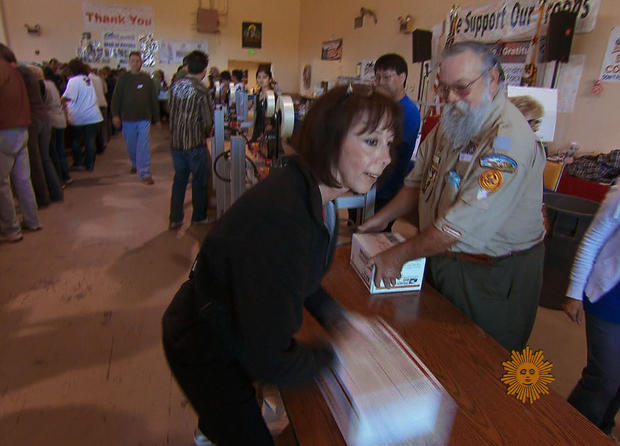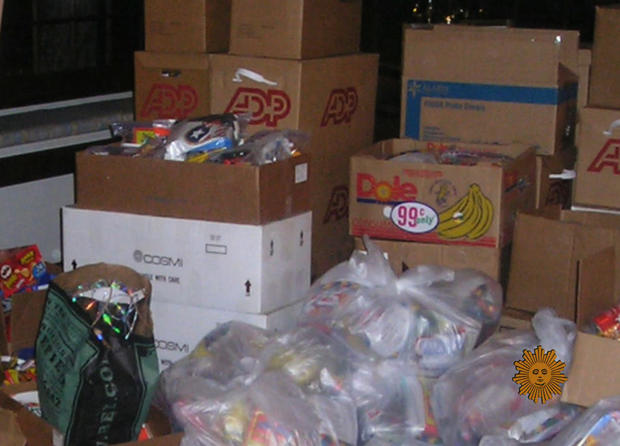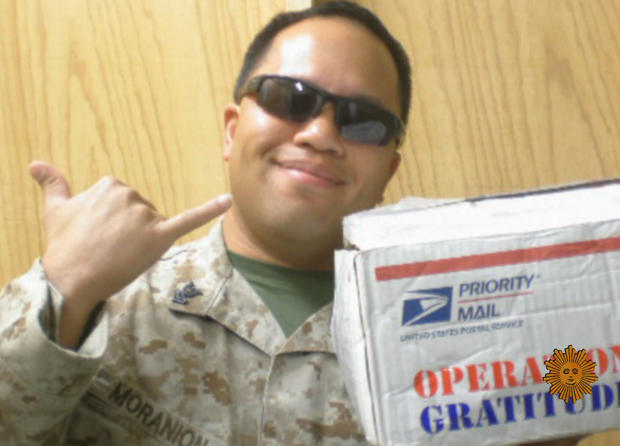Mail call: Sending love to troops abroad
For military personnel far from home for the holidays . . . few sounds are more welcome than the words MAIL CALL. And dedicated volunteers here on the home front are working hard to make sure that none our troops anywhere in the world is disappointed. Our Cover Story is reported now by Tracy Smith:
For a few days every year, hundreds of volunteers crowd a National Guard armory in Van Nuys, Calif., making boxes bound for war.
They're packed with little bits of home: new toothbrushes . . . DVDs . . . Girl Scout cookies . . . hand-knit scarves . . . things that can make life in the combat zone easier, or at least bearable.
The name on the side says it all: Operation Gratitude.
When Tracy Smith asked if there were still a need for care packages since the U.S. has withdrawn troops from Iraq and Afghanistan, Carolyn Blashek - founded Operation Gratitude eight years ago - said, "There's absolutely still a need.
"There are still hundreds of thousands of troops who are away from home, away from their loved ones - at all times of the year, but especially now during the holidays, and they deserve to be remembered."
You might expect this from a veteran or an Army wife. But Blashek is neither. She's a civilian who earned a law degree at Columbia University before becoming a full-time mom, living in the quiet security of an upscale L.A. suburb.
Then came September 11th, and start of the war in Afghanistan.
"I looked at my children - at that point [they] were then 14 and 16 - and I remember thinking, 'Well, this is a war that could go on. But I've already lived half my life and they're just starting out. So I don't want them to be the ones to have to bear this burden. Let me go right now.'"
So Carolyn Blashek did what very few mothers of two might do: She went off to join the Marines.
After being politely told that, at age 46, she was too old to enlist, Blashek wound up volunteering at a military lounge at the L.A. airport.
"I was in the facility by myself one afternoon," she recalled, "and a soldier walked in, very distraught.
"So we sat down, and he explained to me that he was just on emergency leave to bury his mother. His wife had left him, and his only child had died as an infant. He had no one left in his life. And he said to me, 'For the first time in my 20-year career, I'm going to war. I know I'm not gonna make it back, but it doesn't matter because no one would even care.'
"This conversation made me think: What will give them the strength to do what they have to do to survive? And I realized, well, a lot of it has got to be the belief that someone at home cares and wants them to come home, what will give them strength."
The next day, Blashek started making and sending care packages to troops overseas . . . paying for everything out of her own pocket. Her house became a staging area, and she enlisted her family's help, including her then-teenage son Jordan.
"There was a good few-months period where our entire living room was stacked to the top with boxes," Jordan said. "Our entire front porch was covered. We have like a tiny little walkway to get through to the door."
Blashek said her family made sacrifices. "My husband has not had a home-cooked meal, well, I guess since September 11th, pretty much," she laughed. "That's why God invented take-out!"
She now has corporate partners who donate goods by the truckload, and a battalion of volunteers to help out.
Her operation is big, but not impersonal: Every box goes out with a handwritten note of thanks addressed to an individual soldier, sailor or Marine wherever they may be.
The joy of getting a piece of the world they left behind has kept soldiers going for centuries. During the Civil War, mail call was common, if somewhat erratic. As one soldier wrote: "These two weeks have contained all the horror and fatigue that war can furnish. Your letters are the one pleasure."
During World War II, a portion of the mail was photocopied and shipped on microfilm to save cargo space. The system, called V-mail, worked - except for what was known as the "Scarlet scourge": When a lipstick-wearing letter writer would kiss the page.
"It would black out a portion of the letter when it was photographed and [the lipstick] would gunk up the machine," said Lynn Heidelbaugh, curator of a military mail display at the Smithsonian's National Postal Museum.
The exhibit includes a Vietnam-era mailbag with one tiny problem: "They would put it in these waterproof bags that were camouflaged, drop it from helicopters, but it would drop into the jungle foliage and get lost," Heidelbaugh said. "It got the mail out there but the mail couldn't be found!"
It all happens so much faster now: A Postal Service box can go from California to a front line base anywhere in the world in days, not weeks.
Operation Gratitude ships more than 100,000 boxes a year. They're not alone. There are dozens of other outfits with a similar mission to support the troops, from Adopt a Platoon to the USO.
Carolyn Blashek, the suburban mom who was bent on keeping her children out of harm's way also wound up inspiring both to serve: Daughter Jenna got a master's in social work and now helps children in Harlem. Her son Jordan graduated from Princeton and got accepted to medical school, but he came home at Christmas and told his parents something they never expected to hear:
" He said, 'Yup, I've got into medical school. However, I want to serve my country, and I'm joining the Marines,'" Carolyn recalled.
"What went through your head?" Smith asked.
"I mean, really, honestly, is 'God bless you and keep you safe.' That's all. I mean, how could I not be so proud? I mean, here, you know, for all these years I've met so many people in the military who I admire so tremendously. How could I not want my son to become part of that?"
"Even with the risk that goes with it?" Smith asked.
"Yeah, I mean, sure it's hard. I mean, but it's hard for any parent to let go of their child. Even if they're just crossing the street."
First Lt. Jordan Blashek deployed to the Middle East last month.
Even in war, gratitude, it seems, goes both ways. Sgt. Jim Morse knows what it's like to be on the receiving end.
"That care package could have the one thing that that Marine has been craving for months and hasn't been able to get his hands on," he said. "It could just be that one thing that tips the balance of whether he's going to have a bad day or a good day."
Like thousands of others, he wrote Carolyn Blashek a letter:
"Thank you so much for your time, effort, and love. Every time I receive a package from good people like you, I'm greatly humbled and even more proud to be an American. My Marines are faced with heavy combat, dealing with casualties, extreme heat, fatigue, malaria, dysentery, and IEDs. Most are still under 21.
"My boys fight like lions. Be proud of America's sons. They surprise me daily with the strength and bravery they possess. Pardon my digression. I simply want people to know what we face. Again, I thank you on behalf of all of the Marines of 31 Weapons Company. Your support brings us closer to home. Sergeant Jim Morse"
Blashek admitted the letter got to her. "Oh, yeah. Well, 'cause I could picture them."
"You think about your son over there now, too?" asked Smith.
"Try not to."
This week, box number 750,000 is scheduled to roll off Carolyn Blashek's assmbly line. She'll keep it running, she says . . . not just until her son comes home, but until they all do.
For more info:
- Operation Gratitude
- "Mail Call: History of America's Military Mail", Smithsonian National Postal Museum


